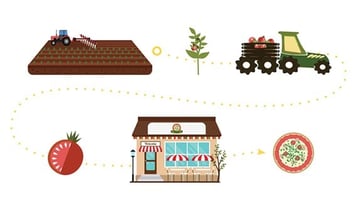Evolving consumer preferences, shifting geopolitical dynamics, and rapid innovation across nearly the entire food chain have spurred record-setting foodtech investment, according to a new report. With the particularly explosive growth in expansion-stage deals, 2021 investments in expansion-stage food tech grew to $13.1 billion in transactions – more than doubling the already strong investment activity in 2020.
What’s Driving Growth in FoodTech Investment?
Consumer Preferences and Behavior
 Sustainability and health remain top of mind for consumers across nearly every industry but particularly within the food space. Over the course of the COVID pandemic, consumers have only doubled down on demand for food that supports their physical well-being and contributes to a healthier environment. Growth in vegan, vegetarian, and flexitarian diets is increasing in tandem as businesses continue to innovate and offer new options for plant-based proteins and alternative milks. As consumer demand has shifted, investors have followed suit. Further growth through the continued expansion of alternative meats, proteins, and milks in major grocery and restaurant chains will only reinforce investment in the space. On top of changing health habits, consumers are becoming much more savvy to the origin and transport of their food, making way for sizeable investments in food traceability and transparency technologies.
Sustainability and health remain top of mind for consumers across nearly every industry but particularly within the food space. Over the course of the COVID pandemic, consumers have only doubled down on demand for food that supports their physical well-being and contributes to a healthier environment. Growth in vegan, vegetarian, and flexitarian diets is increasing in tandem as businesses continue to innovate and offer new options for plant-based proteins and alternative milks. As consumer demand has shifted, investors have followed suit. Further growth through the continued expansion of alternative meats, proteins, and milks in major grocery and restaurant chains will only reinforce investment in the space. On top of changing health habits, consumers are becoming much more savvy to the origin and transport of their food, making way for sizeable investments in food traceability and transparency technologies.
Geopolitical Dynamics
 The COVID-19 pandemic and resulting geopolitical disruption highlighted for many the complexity and fragility of the world’s food supply chain. While traditional methods for addressing food shortages, such as stockpiling supply, can ease the impact, it’s become clear that new approaches are necessary in order to more holistically address food shortages. As the production of many plant-based proteins and alternative milks do not depend on a complex, global orchestration of supplies, investors are seeing the opportunity to capitalize on domestic demand for a more resilient food chain. The Russian invasion of Ukraine and subsequent warnings relating to impacts on wheat, corn, sunflower seed, barley, and more have only further highlighted and strengthened the case for continued investment in businesses and technologies that could potentially shore up the global food supply chain.
The COVID-19 pandemic and resulting geopolitical disruption highlighted for many the complexity and fragility of the world’s food supply chain. While traditional methods for addressing food shortages, such as stockpiling supply, can ease the impact, it’s become clear that new approaches are necessary in order to more holistically address food shortages. As the production of many plant-based proteins and alternative milks do not depend on a complex, global orchestration of supplies, investors are seeing the opportunity to capitalize on domestic demand for a more resilient food chain. The Russian invasion of Ukraine and subsequent warnings relating to impacts on wheat, corn, sunflower seed, barley, and more have only further highlighted and strengthened the case for continued investment in businesses and technologies that could potentially shore up the global food supply chain.
Innovation and Tech Advancement
 As capital has continued to flow into the foodtech space in recent years, technological innovations have made these investments all the more lucrative and created even more opportunities for investment and growth. Foodtech businesses continue to realize near-complete nutritional replacement in many alternative food products, creating a greater incentive for consumers seeking options with sustainability and health in mind. Bolstering this innovation in the foodtech space is the equally explosive growth in innovation and investment in the adjacent agtech industry. As farming, fertilization, pest control, and harvesting have experienced innovations, farmers are able to realize more sustainable production, which in turn creates the space for greater innovation throughout the rest of the food supply chain.
As capital has continued to flow into the foodtech space in recent years, technological innovations have made these investments all the more lucrative and created even more opportunities for investment and growth. Foodtech businesses continue to realize near-complete nutritional replacement in many alternative food products, creating a greater incentive for consumers seeking options with sustainability and health in mind. Bolstering this innovation in the foodtech space is the equally explosive growth in innovation and investment in the adjacent agtech industry. As farming, fertilization, pest control, and harvesting have experienced innovations, farmers are able to realize more sustainable production, which in turn creates the space for greater innovation throughout the rest of the food supply chain.
Final Words on FoodTech Investment in 2021
Success from companies in areas such as alternative and plant-based proteins and non-dairy milks has buoyed investor interest in emerging foodtech spaces, particularly as many investors once believed that the capital and infrastructure investments necessary to support scaled production of alternative proteins and milks outweighed the potential payoff.
Looking ahead, innovation has proven to spur even greater innovation and growth in the foodtech industry. Consumer demand for health and sustainability is feeding up and forcing regulatory action that supports greater traceability, more stringent environmental protections, and greater oversight of the food supply chain. In the private sector, businesses are more rigorously looking toward their suppliers to ensure that every aspect of their supply chain is being run with sustainability and environmental protection in mind. Foodtech investment looks to be on a continued upward trajectory has myriad factors contribute to an environment ripe for even further innovation.
Tag(s):
Food Industry
Other posts you might be interested in
View All Posts
4 min read
| December 11, 2019
Crafting the Case for Traceability: How to Gain Buy-in from Executive Leadership
Read More
Recall
6 min read
| May 4, 2022
Learn How to Make Withdrawals 10x Faster at the 2022 Food Safety Summit
Read More
Food Industry
6 min read
| September 15, 2016

